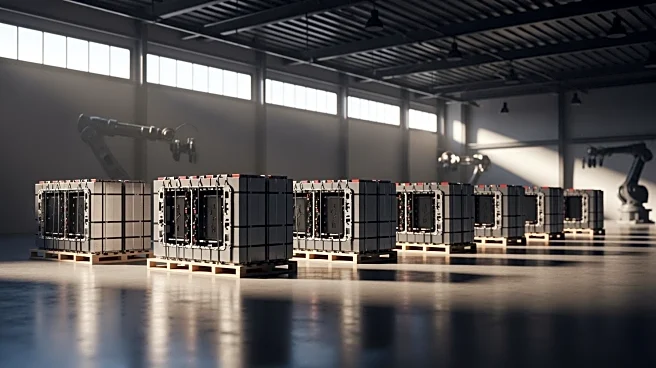What's Happening?
Governor Gavin Newsom has vetoed Assembly Bill 93, which would have mandated data centers in California to report their water usage. The bill, introduced by Assemblymember Diane Papan, aimed to require new data centers to disclose expected water use when applying for business licenses and to report annual water consumption. The veto comes as data centers proliferate in California and other western states, driven by the rise of artificial intelligence and increased investments in cloud computing. These centers, which house extensive equipment, generate significant heat and require substantial water for cooling. Despite the growing strain on water resources in arid states like California, Arizona, and Texas, Newsom expressed reluctance to impose strict reporting requirements without fully understanding the impact on businesses and technology consumers. The bill faced opposition from business groups, including the Data Center Coalition.
Why It's Important?
The veto of Assembly Bill 93 highlights the tension between technological advancement and sustainable resource management. As AI and cloud computing drive the expansion of data centers, the demand for water in these facilities increases, posing challenges in regions already facing water scarcity. The decision reflects a prioritization of technological infrastructure development over immediate environmental concerns, potentially affecting water management strategies in drought-prone areas. Stakeholders in the technology sector may benefit from reduced regulatory burdens, while environmental advocates express concerns over unchecked water usage. The balance between innovation and sustainability remains a critical issue as California navigates its role as a leader in the tech industry.
What's Next?
Assemblymember Diane Papan has indicated her intention to continue pursuing legislation that balances technological innovation with sustainable resource management. Future efforts may involve revising the bill to address concerns raised by Governor Newsom and business groups, potentially incorporating more flexible reporting requirements. As the demand for data centers continues to grow, stakeholders will likely engage in discussions to find solutions that accommodate both industry needs and environmental sustainability. The ongoing dialogue may lead to new proposals or amendments aimed at achieving a compromise that satisfies both technological and ecological priorities.
Beyond the Headlines
The veto raises broader questions about the ethical and environmental responsibilities of the tech industry in resource management. As data centers expand, the need for sustainable practices becomes increasingly urgent, prompting discussions on the long-term impacts of water usage in technology development. The decision may influence other states facing similar challenges, potentially setting a precedent for how technology and environmental policies intersect. The debate underscores the importance of integrating environmental considerations into the planning and operation of digital infrastructure, highlighting the need for innovative solutions that address both technological growth and ecological preservation.










